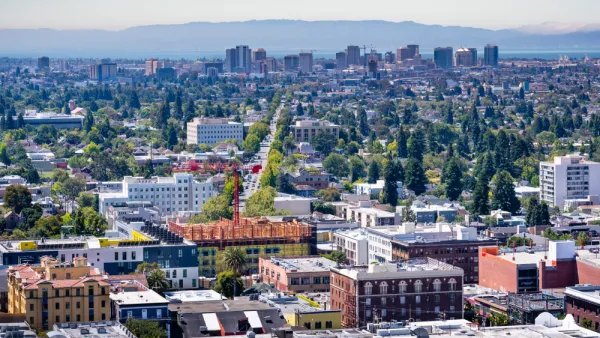The parking reform movement has a major new feather in its cap: the Toronto City Council has this week adopted sweeping changes to the parking requirements of the city's zoning bylaws.

The Toronto City Council this week adopted Zoning Bylaw Amendments that will remove most minimum parking requirements for new developments, according to a press release published by the city of Toronto. Parking maximums have also been added.
The city reports that the changes to the city's parking requirements align with goals set by its climate action strategy, TransformTO, approved in 2017, and the Provincial Policy Statement and the Growth Plan, adopted in 2019.
An article by Erin Nicole Davis for Storeys provides more details about the expected impact of the drastic parking reforms adopted by the fourth-most-populous city in North America.
Part of the reasoning behind the reforms is a pattern of overbuilt parking in new residential developments. According to Davis, "The Residential Construction Council of Ontario (RESCON) says data shows that in new condo projects, an average of 33% of parking stalls were left unsold. One builder, according to RESCON, had 90% still available for sale as a building neared construction."
RESCON also estimates that the price of building a parking spot has increased dramatically in recent years—from $80,000 to $165,000 in three years.
Planetizen shared news that Toronto was heading toward a historic moment in parking reform in November, but Toronto announced the potential for parking reforms [paywall] back in February.
Toronto becomes the latest city to roll back parking requirements in 2021, joining San Diego, Boston, Denver, Minneapolis, and Berkeley—although Toronto's reforms are far more universal than many, but not all, of the cities on that list. Planners in Raleigh, St. Paul, and Dallas are also working on parking reforms, and could have legislation for approval relatively soon.
There's also a crowd sourced map of all the cities that have adopted parking reforms.
FULL STORY: Toronto Removes Parking Minimums for New Residential Developments

National Parks Layoffs Will Cause Communities to Lose Billions
Thousands of essential park workers were laid off this week, just before the busy spring break season.

Retro-silient?: America’s First “Eco-burb,” The Woodlands Turns 50
A master-planned community north of Houston offers lessons on green infrastructure and resilient design, but falls short of its founder’s lofty affordability and walkability goals.

Delivering for America Plan Will Downgrade Mail Service in at Least 49.5 Percent of Zip Codes
Republican and Democrat lawmakers criticize the plan for its disproportionate negative impact on rural communities.

Test News Post 1
This is a summary

Test News Headline 46
Test for the image on the front page.

Balancing Bombs and Butterflies: How the National Guard Protects a Rare Species
The National Guard at Fort Indiantown Gap uses GIS technology and land management strategies to balance military training with conservation efforts, ensuring the survival of the rare eastern regal fritillary butterfly.
Urban Design for Planners 1: Software Tools
This six-course series explores essential urban design concepts using open source software and equips planners with the tools they need to participate fully in the urban design process.
Planning for Universal Design
Learn the tools for implementing Universal Design in planning regulations.
EMC Planning Group, Inc.
Planetizen
Planetizen
Mpact (formerly Rail~Volution)
Great Falls Development Authority, Inc.
HUDs Office of Policy Development and Research
NYU Wagner Graduate School of Public Service





























